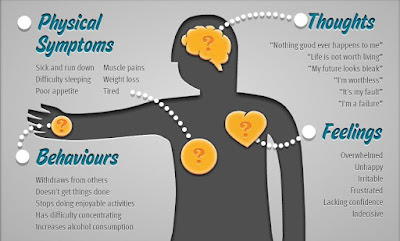Cyclothymia or cyclothymic disorder is a relative mild mood disorder. It is also a one type of Bipolar Disorder which is not a severe one . Might be it is the first stage of the Bipolar disorder and the final stage is Type 1 : Bipolar Disorder is the severe bipolar disorder which needs extreme and proper treatment to overcome cyclothymia.
In cyclothymia disorder moods swing between low and high mood disorder and lasts for 2 years . Back to back the mood of hypomania and major depression shifts . When these shifting of moods reaches the saturation point , then there is a chances of facing Type 1 : Bipolar disorder. People with cyclothymic disorder have milder symptoms than occur in full-blown bipolar disorder.
Symptoms of Cyclothymic Disorder
Cyclothymic symptoms alternates between the high and low emotional. The high emotional consists of symptoms of hypomania and low emotional consists of symptoms of major depression.
Cyclothymia symptoms have less effects or cause than the Type 1 : Bipolar Disorder. With cyclothymia you can do your normal day to day life but if left untreated ,there is more chances of getting severe bipolar disorder .
Symptoms that arise during hypomanic episode
An exaggerated feeling of happiness (extreme happy for no reason)
Inability to concentrate or gets distracted easily
Decreased sleep
Inflated self-esteem
Talking more than usual
Hyperactive
Increased drive to perform goals.
Symptoms that arise during Depressive episode:
Changes in weight
Decreased sleep
Extreme sadness
Restlessness
Feeling tired
Loss of interest in activities once considered enjoyable
Problem concentrating
Having suicidal thoughts.
Fact about a Cyclothymic Disorder
Cyclothymic Disorder is a genetic problem. Based on a survey taken by the researchers most people who suffers from the cyclothymic bipolar disorder , one of their family member or relative is affected by bipolar disorder.
You cannot exclude this fact not only for this type of bipolar disorder , it is applicable for all type of mental illness.
Treatments for Cyclothymic Disorder
Cyclothymia frequently goes undiagnosed and untreated. Most people's symptoms are mild enough that they do not seek mental health treatment. In fact, some people resist the idea of treatment, which reduces their "up" episodes as well as "down."
The depressive symptoms of cyclothymic disorder are typically more frequent, unpleasant, and disabling than the hypomanic symptoms. Feelings of depression or instability are usually what cause people with cyclothymia to seek help.
Using a Mood stabilizer or antidepressant have been useful for the recovery along with the psychotherapy.
Some of the Mood stabilizer Includes:
lithium - which is commonly used to treat bipolar disorder
anti-epileptic drugs – such as carbamazepine, oxcarbazepine or sodium valproate
Some antipsychotics like quetiapine have also been used as mood stabilizer.
If medication may not be enough for the people , then your doctor may suggest to go for the psychotherapy treatment .
CBT(Cognitive Behavioural therapy ) : can be effective. CBT involves talking to a trained therapist to find ways to help you manage your problems by changing the way you think and behave. It can't remove your problems, but may help you manage them in a more positive way.
How do you know you have cyclothymic Disorder
If you have cyclothymia you will have alternate extreme happiness and followed by deep sadness. When you experience hypomanic episode (extreme happiness) will get no sleep . After a week , you may get major depressive episode
Mood swings will be fairly frequent, as well as persistent – you'll have no more than two symptom-free months in a row.
Your fluctuating moods need to have lasted at least two years .





